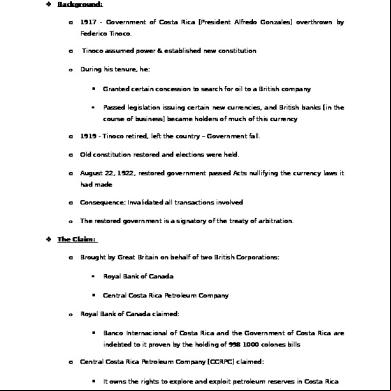Small Presentation On Arbitration Agreement 1t152m
This document was ed by and they confirmed that they have the permission to share it. If you are author or own the copyright of this book, please report to us by using this report form. Report 3b7i
Overview 3e4r5l
& View Small Presentation On Arbitration Agreement as PDF for free.
More details w3441
- Words: 476
- Pages: 12
ARBITRATION AGREEMENT
BY:DEEPTI SINGH(11) PRERNA SHUKLA(30)
“ARBITRATION AGREEMENT” means an agreement by the parties to submit to arbitration all or certain disputes which have arisen or which may arise between them in respect of a defined legal relationship or not. [sec.7(1)]
The person who is appointed to determine differences and disputes is called the ARBITRATOR or ARBITRAL TRIBUNAL. The proceedings before arbitrator are called arbitration proceedings. Arbitrator’s decision is called an AWARD. Arbitral tribunal may consist of a sole arbitrator or a of arbitrators. The no. of arbitrators shall not be in even number.
Essentials of Arbitration Agreement:
It must be in writing.[sec.7(3)] It must have all the essential elements of a valid contract. It must be to refer a dispute, present or future, between the parties to arbitration. It may be in the form of an arbitration clause in a contract or in the form of a separate agreement.[sec.7(2)]
ADVANTAGES OF ARBITRATION:
Avoidance of publicity, for the proceedings are held in private. Simplicity of procedure, as procedures are held more informally. Avoidance of delay and uncertainty involved in appeals, as the award, assuming it to be valid, is final. Reduction of expenses.
DISADVANTAGES OF ARBITRATION:The arbitrator may be incompetent (both in the trade and in the legal aspects of the matter) or biased; Injustice may result from the informality of the procedure.
TYPES OF ARBITRATION:
FOREIGN ARBITRATION: takes place outside India and delivers arbitral award known as foreign award. ARBITRATION CONDUCTED IN INDIA: a) International commercial Arbitration- one party is foreign b) Domestic arbitration- both the parties are domestic.
PRESENTATION (2) ARBITRATION AGREEMENT CASES:
BY: Prerna Shukla(30) Deepti Singh(11)
CASE:1 B and C enter into an agreement to submit their differences to arbitration. The parties have reduced the agreement to writing but have not signed the same. But they have given their consent verbally. Is the agreement valid?
CASE:2
A and B enter into an agreement in writing to refer their differences to arbitration. One of the of the agreement is that arbitrator will be appointed by Z, who is not a party to the agreement. To empower a stranger to the agreement to appoint arbitrator valid?
CASE:3 A dispute arose between A,B and C, three neighbors, on the distribution of wages paid to the street watchman. A and B decided to refer the dispute to X for arbitration. X, by an award fixed the liability of A,B and C to contribute wages in the ratio of 3:2:2. Is the award binding on C ?
CASE:4 (Cook vs Catehpole-1864)
A partnership deed contained an arbitration clause. A suit was filed by one of the partners against his other partners for misappropriation of partnership money and for improper retention of the balance. Can such matters come under arbitration clause?
BY:DEEPTI SINGH(11) PRERNA SHUKLA(30)
“ARBITRATION AGREEMENT” means an agreement by the parties to submit to arbitration all or certain disputes which have arisen or which may arise between them in respect of a defined legal relationship or not. [sec.7(1)]
The person who is appointed to determine differences and disputes is called the ARBITRATOR or ARBITRAL TRIBUNAL. The proceedings before arbitrator are called arbitration proceedings. Arbitrator’s decision is called an AWARD. Arbitral tribunal may consist of a sole arbitrator or a of arbitrators. The no. of arbitrators shall not be in even number.
Essentials of Arbitration Agreement:
It must be in writing.[sec.7(3)] It must have all the essential elements of a valid contract. It must be to refer a dispute, present or future, between the parties to arbitration. It may be in the form of an arbitration clause in a contract or in the form of a separate agreement.[sec.7(2)]
ADVANTAGES OF ARBITRATION:
Avoidance of publicity, for the proceedings are held in private. Simplicity of procedure, as procedures are held more informally. Avoidance of delay and uncertainty involved in appeals, as the award, assuming it to be valid, is final. Reduction of expenses.
DISADVANTAGES OF ARBITRATION:The arbitrator may be incompetent (both in the trade and in the legal aspects of the matter) or biased; Injustice may result from the informality of the procedure.
TYPES OF ARBITRATION:
FOREIGN ARBITRATION: takes place outside India and delivers arbitral award known as foreign award. ARBITRATION CONDUCTED IN INDIA: a) International commercial Arbitration- one party is foreign b) Domestic arbitration- both the parties are domestic.
PRESENTATION (2) ARBITRATION AGREEMENT CASES:
BY: Prerna Shukla(30) Deepti Singh(11)
CASE:1 B and C enter into an agreement to submit their differences to arbitration. The parties have reduced the agreement to writing but have not signed the same. But they have given their consent verbally. Is the agreement valid?
CASE:2
A and B enter into an agreement in writing to refer their differences to arbitration. One of the of the agreement is that arbitrator will be appointed by Z, who is not a party to the agreement. To empower a stranger to the agreement to appoint arbitrator valid?
CASE:3 A dispute arose between A,B and C, three neighbors, on the distribution of wages paid to the street watchman. A and B decided to refer the dispute to X for arbitration. X, by an award fixed the liability of A,B and C to contribute wages in the ratio of 3:2:2. Is the award binding on C ?
CASE:4 (Cook vs Catehpole-1864)
A partnership deed contained an arbitration clause. A suit was filed by one of the partners against his other partners for misappropriation of partnership money and for improper retention of the balance. Can such matters come under arbitration clause?





